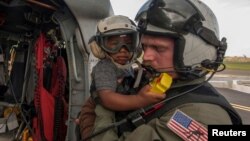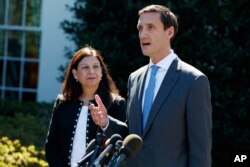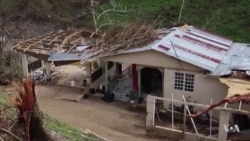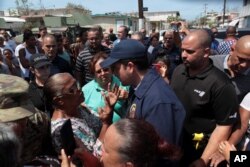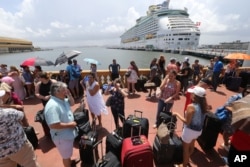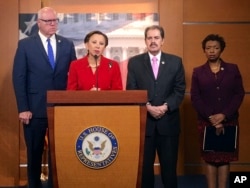The Pentagon has appointed Lt. Gen. Jeffrey Buchanan to lead all military hurricane response efforts in Puerto Rico.
Buchanan, a three-star general, is expected to arrive in Puerto Rico later Thursday, according to VOA Pentagon Correspondent Carla Babb.
The Trump administration has been criticized for not responding more quickly to the crisis in the U.S. territory, which was wracked by Hurricane Maria on Sept. 17.
On Thursday, Homeland Security Adviser Tom Bossert defended the eight-day period between the declaration of an emergency in Puerto Rico and the naming of a leader for recovery efforts.
"It didn't require a three-star general eight days ago," he told reporters at a White House news briefing. Bossert also said some of the information he has heard on the news has been out of date. "The coverage in some cases is giving the appearance that we are not moving fast enough," he said.
He told reporters that currently there are 44 operational hospitals in Puerto Rico, out of 69 total.
Acting Homeland Secretary Elaine Duke told reporters at the same briefing that 200 gas stations are open for people to fuel their power generators.
Bossert also added, "The president and I have absolute, 100 percent confidence in what Secretary Duke, [FEMA Director] Brock Long, and the men and women of Puerto Rico are doing. They are going to get through this."
FEMA regional administrator John Rabin told reporters Thursday that the U.S. government has so far delivered 1.1 million liters of water and about 1 million meals to the island of 3.5 million.
WATCH: US Officials Say Damaged Infrastructure Slows Aid Distribution in Puerto Rico
But he added that ships, not planes, are needed to get more supplies to the island.
"The only way we are going to get significant amounts of water and food is through ports and through barges and shipping," he said. "You can't get enough through the aircraft."
He said officials are "very focused" on getting supplies from the ports to the distribution centers.
Army Brigadier General Richard Kim told reporters there are 4,400 Defense Department personnel in Puerto Rico, including Puerto Rican National Guard members.
Earlier Thursday, the Trump administration suspended a law that had been hampering delivery of desperately needed aid to hurricane victims, while House Speaker Paul Ryan said the Federal Emergency Management Agency's disaster relief account would receive an additional $6.7 billion boost within days.
White House Press Secretary Sarah Huckabee Sanders tweeted Thursday that the law known as the Jones Act had been waived for 10 days at the request of Puerto Rico's governor Ricardo Rossello.
Rossello said the island's 3.4 million people are facing a humanitarian disaster. "This is the single biggest, major catastrophe in the history of Puerto Rico, bar none, and it is probably the biggest hurricane catastrophe in the United States," Rossello told reporters as he delivered aid Wednesday in the southern town of Salinas.
The island's power grid was nearly destroyed by two hurricanes that hit the island in rapid succession, leading officials to predict it may take many months to completely restore reliable electricity service — affecting access to medical treatments and running water, as well as depriving millions of air conditioning in tropical heat.
"Recovery is not going to be an overnight thing," said Duke. "It is going to take a long time."
Speaking to reporters Thursday after briefing President Donald Trump, Duke said, "Everything has been prioritized. We went to hospitals first, now we're on gas stations. This is a conscious effort to make sure we don't have loss of life." She said the federal government has 7,200 troops and more than 2,500 others on the ground to assist with emergency response.
Among the top priorities, Duke said, is restoring communications. "We have to get, for instance, AT&T in. They are rebuilding the cellular phone system. That is the priority right now. We have food and water. We have plenty of diesel fuel," she told reporters.
Officials acknowledged, however, that huge challenges still exist in aid delivery and in heading of a public health crisis. Thousands of 20-food containers of life-saving food and water that have arrived in recent days are stacked up on the docks in the port of San Juan, waiting for distribution. A shortage of truck drivers, however, is holding up the operation.
Trump is slated to visit Puerto Rico and the U.S. Virgin Islands next Tuesday, but he has been roundly criticized for the slowness of Washington’s response to the island’s plight.
Critics had noted that Trump had issued Jones Act waivers more quickly following hurricanes that hit recently in Texas, Louisiana and Florida. After the president suggested that Puerto Rico was "in deep trouble in part because of problems that predated Hurricane Maria," a Washington Post opinion piece bluntly asked, "Did Trump Just Figure Out Puerto Ricans are Americans?"
On Capitol Hill on Thursday, House Democrats called for urgent legislation to assist Puerto Rico and the U.S. Virgin Islands.
During a briefing, Congresswoman Nydia Velazquez, a New York Democrat, said she found conditions "shocking" when she visited the area last Friday.
"Those images were burned into my mind. Yet, what I also saw was inspiring. The spirit of the Puerto Rican people who refuse to quit, who will not give up and who want to get back to rebuilding the island they love," she added.
Prominent Puerto Rican and Caribbean athletes and entertainers have urged the administration to act more forcefully to help victims who have been without basic needs for days. The singer Rihanna, a native of Barbados, Thursday posted a picture of a New York Daily News front page pleading with the president to act.
Apparently stung by the criticisms, administration officials have emphasized the complexity of delivering aid to the storm-ravaged territory.
"This is an insular island, a territory that stands some distance from the United States," Bossert said.
"The constraints and limitations are different from a contiguous state here in the United States. We can position hundreds of trucks in Florida or Texas for restoration of line services. We can't do that in Puerto Rico."




